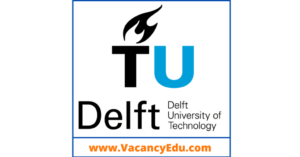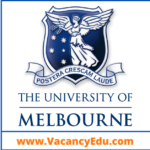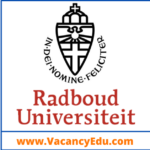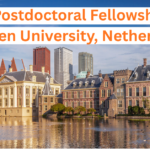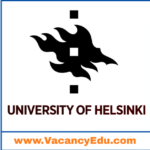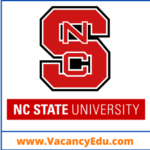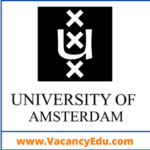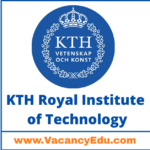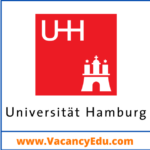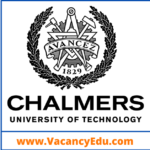Delft University of Technology (TU Delft), Netherlands invites online Application for various Postdoctoral Fellowship in their different Departments. We are providing a list of Postdoc Fellowship positions available at Delft University of Technology (TU Delft), Netherlands.
Eligible candidate may Apply as soon as possible.
(01) Postdoctoral Fellowship Position
Postdoc Fellowship Position summary/title: PostDoc R&D in ensuring data security
The Cybersecurity (CYS) group at the Faculty of Electrical Engineering, Mathematics and Computer Science (EEMCS) invites applications for full-time doctoral candidates in the area of Data-driven Cybersecurity. Successful candidates will follow a data-driven approach by collecting and analyzing massive network and web data to improve security and privacy in the Internet. Examples include fighting cyber threats (e.g., ransomware, phishing, denial of service attacks, scanning for system vulnerabilities), identifying and mitigating network and Web vulnerabilities (e.g., unauthorized access, user tracking), and assessing the adoption of user data protection regulations (e.g., GDPR) in the wild. Successful candidates will have the opportunity to work closely with world-class researchers at TU Delft and our research collaborators in Europe and the US. Our group conducts research in a range of cybersecurity topics, including, secure data analytics, applied cryptography, privacy, cloud security, system security, and network security. We aim to make the world a safer place as most of our activity and data move online. We design, develop, and evaluate interdisciplinary solutions that combine all fields of computer sciences: artificial intelligence, systems, and theory. Examples include the development of applied cryptography, deep learning methods that are immune to common side-channel defences, machine learning algorithms that can operate on encrypted data in the cloud, detection and mitigation of large scale distributed denial of service attacks, and analysis of the latest security threats. We aim to publish our results at top conferences and journals, transfer our scientific know-how and technologies to students and our public and private partners in the field of cybersecurity, and have impact in society and the research community.
Deadline : February 1, 2024
(02) Postdoctoral Fellowship Position
Postdoc summary/title: Postdoc Numerical Modelling of Cyclically Loaded Monopile Foundations for Offshore Wind Turbine
We invite applications for a Postdoctoral position within the Offshore Engineering Group at TU Delft’s Civil Engineering faculty. In this role, the successful candidate will contribute to advancing our understanding of the cyclic behaviour of offshore foundations both under environmental (wind-wave) and seismic loading conditions. The selected applicant will explore and advance our understanding of cyclic soil-monopile interaction, working with state-of-the-art experimental data (geocentrifuge) and numerical modelling. Within this domain, there are scientific challenges in comprehending the fundamental nature of cyclic behaviour in both cohesive and cohesionless soils. Equally intriguing is the translation of this understanding into practical engineering models. The role will involve the meticulous development, set-up, and calibration of 3D Finite Element monopile models, coupled with the implementation of constitutive models. The candidate will be immersed in projects with strong industrial support.
Deadline : 9 January 2024
Looking for more Postdoctoral Positions Click Here
(03) Postdoctoral Fellowship Position
Postdoc Fellowship Position summary/title: Postdoc Integrated Optimization- and Learning-based Multi-agent Control of Large-scale Networks with Hybrid Dynamics
In this postdoc project we will develop integrated optimization-based and learning-based control methods for large-scale hybrid systems – in particular network systems with piecewise affine (PWA) dynamics. More specifically, the aim is to develop innovative approaches to combine model predictive control (MPC) and reinforcement learning so as to merge the advantages of both approaches, and to embed them in a distributed/multi-agent control setting. The key challenge will be to determine efficient approaches to obtain coordination among the control agents. We will also investigate performance-related topics such as stability, computational complexity, error bounds, formal or probabilistic performance guarantees, robustness, finite-termination effects, safety, etc.
Deadline :8 January 2024
(04) Postdoctoral Fellowship Position
Postdoc Fellowship Position summary/title: Postdoc Robust Machine-Learning-Based Detection and Classification for Autonomous Underwater Robots
In this project we will develop novel and robust machine-learning-based approaches for detection and classification for underwater robots using multi-sensor data from cameras, sonar, and magnetic sensors. The overall aim is to collectively detect and afterwards remove unwanted objects from coastal waters and seabeds. In this way the project contributes to keeping coastal waters clean, to protecting the environment, and to realizing global sustainability objectives. This postdoc project is part of the Horizon Europe project SeaClear2.0 (Scalable full-cycle marine litter remediation in the Mediterranean: Robotic and participatory solutions, see also https://www.seaclear2.eu). The goal of SeaClear2.0 is to develop a collaborative multi-robot solution engaged in collecting marine waste using autonomous underwater robots. The aim is to realize efficacious marine litter detection and collection, while at the same time minimizing impact on underwater flora and fauna like seaweed and fish. This goal will be reached by bringing together state-of-the-art technologies from the fields of machine learning, control. optimization, and marine technologies and by building a stable and trustworthy system that is able of tackling sea and ocean pollution.
Deadline : 8 January 2024
(05) Postdoctoral Fellowship Position
Postdoc Fellowship Position summary/title: Postdoc – Digital Twins for Dynamic Coastal Dune Fronts for Safety and Ecosystem Development under Increased Climate Pressure
Innovative coastal protection strategies are needed in view of increasing pressures on coastal systems due to stronger climatic forcing and ecosystem decline. Increasing knowledge on the physical and ecological processes that govern dynamic coastal systems allows for innovations in coastal protection strategies. The development of dunes in front of dikes is such an innovation. Combined dune/dike constructions may benefit coastal protection, create coastal habitats, provide room for recreation and increase biodiversity amongst other benefits for society. Although the combination of hard (dike) and soft (sediments) methods comes with increased uncertainties, knowledge on processes may be used to mitigate uncertainties and inform decision making in the design and maintenance of such combined structures. For this we want to develop a digital twin that uses the rich evidence base (consisting of models, data, experiences etc.) on coastal processes, ecology, dunes and dikes to inform decisions related to the design and maintenance of combined/hybrdid structures. This work fits in the European “DuneFront” project that is cooridnated by Ghent University and involves a network of 17 international univeristies, research organisations, governments and companies. DuneFront aims to optimize dune-dike hybrid Nature-based Solutions as a new generation of sustainable, inclusive and aesthetic blue-grey coastal management infrastructure, that further mainstreams biodiversity into one of the most important socio-economic challenges along European coasts.
Deadline : 7 January 2024
Click here for “Postdoc Application Cover Letter Template”
Click here to know “How to write a Postdoc Job Application or Email”
(06) Postdoctoral Fellowship Position
Postdoc Fellowship Position summary/title: Postdoc Film Extrusion of Functional Polymer Nanocomposite for Inductive Polymer Welding Processes
The mobility sector is undergoing drastic changes to radically adjust its footprint to contribute to the energy and material transition. In this Next Gen Initiative, Dutch companies and knowledge institutions work together to develop advanced manufacturing approaches for sustainable thermoplastic composite structures considering the entire life cycle. Polymer-based joining and disassembly processes, referred to as welding and de-welding are of particular interest. Here, we wish to embed magnetic (nano) particles to into polymer matrices or films, creating functional nanocomposite, to melt the material on-demand in alternating magnetic field (induction) for highly tailored fusion processes. You will be developing a compounding and film extrusion process to disperse candidate magnetic (nano)particle into high performance polymers. This includes investigating and developing (in-line) characterisation techniques to evaluate the homogeneity and magnetic properties of the compound. Finally, you will develop a custom inductive heating setup to evaluate the heating and melting performance of the functional polymer films by using advanced non-invasive monitoring techniques.
Deadline : 7 January 2024
(07) Postdoctoral Fellowship Position
Postdoc Fellowship Position summary/title: Postdoc in Machine Learning-driven Modeling of Metallic Microstructures
Contribute to cutting-edge research in the field of materials science by developing innovative machine learning-driven models for the analysis and prediction of complex metallic microstructures. This role presents a unique opportunity to address critical questions related to the structure-property relationships of metals, unlocking new possibilities for engineering and design in various industries.
Deadline : 7 January 2024
(08) Postdoctoral Fellowship Position
Postdoc Fellowship Position summary/title: Postdoc in the Ethical Impact of Technology on Society
There’s been a lot of fake news and fear-mongering around emerging technologies. But what is true is that they will substantially transform existing tech and impact our society in various ways. Imagine the life-saving medical applications of quantum sensors, the data-crunching capabilities of quantum computing, and the encryption possibilities of quantum internet, for instance. As a postdoc at TU Delft, you will work with a pioneering academic team to conduct ethical and societal analyses related to these technologies. You will explore the impact of quantum technologies in the initial phases of their development and study the increasingly polarising geopolitical competition for access to these technologies. For the duration of your postdoc (2.5 years), you will be part of a supportive, multicultural team led by Dr Pieter Vermaas, in the Ethics/Philosophy of Technology department at the Faculty of Technology, Policy and Management at TU Delft. One of your core tasks will be figuring out how to fairly allocate the computing time of the first European quantum computers made available by the European Quantum Flagship programme, taking contemporary geopolitics, ethics and international solidarity into account. In this role, you will also work with the Dutch Centre for Quantum and Society to develop tools that measure the impact of quantum technologies. Based on your collaborative research, you will make ethical recommendations to funding agencies, industry, policy and other actors guiding the R&D of these technologies. So doing, you will help to make quantum technology more globally inclusive, now and in the future.
Deadline : January 7, 2024
Click here to know “How to Write an Effective Cover Letter”
(09) Postdoctoral Fellowship Position
Postdoc Fellowship Position summary/title: Postdoc on Autonomous Intra-Terminal Barges for Automated Cargo Transhipment
In 2019 the European Commission launched the European Green Deal strategy to overcome climate change challenges. Aiming at reducing the GHG emissions of transport by 90% by 2050, seaports will play a major role in boosting the use of cleaner technologies, green energy carriers and logistics concepts in maritime transport, port operations and hinterland transport. The Horizon 2020 project MAGPIE accelerates the introduction of green energy carriers combined with realisation and logistic optimisation in ports through automated and autonomous operations. MAGPIE will create demonstrations and pilot projects in living laboratory environments to advance technological, operational, digital and organisational aspects of energy supply for use in ports and reduce emissions. One of the objectives of the MAGPIE project is to improve the maritime and inland waterway transport by developing and demonstrating autonomous intra-terminal barges and automated cargo transhipment.
Deadline : Open Until Filled
Connect with Us for Latest Job updates
(10) Postdoctoral Fellowship Position
Postdoc Fellowship Position summary/title: Postdoc Position on Process Dynamics and Control for Direct Air Capture
To stop global warming, it is vital to reduce carbon dioxide emissions (CO2) to net zero within the coming decades. This involves not only preventing new emissions (mitigation), but also actively removing CO2 from the atmosphere. This Carbon Dioxide Removal (CDR) serves to neutralize emissions from hard-to-abate sectors, (e.g. aviation), and to restore atmospheric CO2 concentrations to pre-industrial levels. Direct Air Capture (DAC) is one of the key technologies in this field, providing safe, permanent, flexible, and scalable negative emissions. DAC involves contacting large quantities of air with sorbent materials to capture CO2, and subsequently using temperature and/or pressure adjustments to release it in a pure stream for storage or conversion. This regeneration step is energy-intensive, and therefore expensive. In this project, we seek explore control strategies that will allow a DAC plant to make efficient use intermittent supplies of renewable energy. In this project, you will build a mathematical model of a Direct Air Capture installation, with a focus on weather and energy availability dynamics. You will study the sensitivity of the system, and derrive simplified/black-box models based on its output data. Lastly, you will develop optimization-based predictive control strategies and assess their effectiveness for optimising DAC under variable conditions.
Deadline : 7 January 2024
(11) Postdoctoral Fellowship Position
Postdoc Fellowship Position summary/title: PostDoc position: Temperature effects on microbial electrosynthesis from CO2
Power-to-Chemicals and Power-to-Fuels processes are the future of the chemical industry. The chemical industry is a major greenhouse gas emitter. To meet their GHG emission reduction target, the chemical industry must use alternative carbon sources (e.g. CO2) and electricity-based processes (Power-to-X). The perspective of a highly electrified chemical industry where renewable feedstocks and energy are the basic ingredients of chemicals is very appealing to many societal, industrial and governmental stakeholders. Microorganisms are able to grow on electrodes and utilize renewable electricity to convert CO2 to valuable chemicals. This Power-to-X process is called microbial electrosynthesis (MES), and is the focus of this postdoctoral project. This postdoc project is part of a larger project (2 PhD and 2 postdocs) and a consortium composed of eight international companies, which all together will investigate heat in CO2 electrolyzers (including MES). A major hurdle in upscaling CO2 electrolyzers is that a significant part of the heat that is generated adversely affects component stability, product throughput and selectivity. In this postdoc project, our state-of-the-art MES process will be used (converting CO2 to C2-C6 carboxylic acids and alcohols) and our distinctive approach will determine the temperature dependency of the biofilm’s functionality and stability as well as the temperature effects at the reactor scale. We will use the attained insights to develop a scalable process under industrially relevant conditions.
Deadline : 7 January 2024
Polite Follow-Up Email to Professor : When and How You should Write
(12) Postdoctoral Fellowship Position
Postdoc Fellowship Position summary/title: Postdoc CirculaREE
The European Union (EU) lists Rare-Earth Elements (REEs) as critical raw materials with highest rank in terms of supply risks. For this reason, enhancing the circularity of REEs – that is, the potential reuse, remanufacturing, or recycling of REEs – is a top priority. To increase the circularity potential of REEs, the products containing REEs – such as electric motors – should be (re)designed to optimize each stage of the product’s life cycle. Obviously, the (re)design affects manufacturing, service-life, and end-of-life processing routes, and, consequently, the circularity of REEs. However, this poses several integration challenges, as different stages of the product’s life cycle require highly specialized knowledge from different stakeholders. A prominent example is the extremely low recycling rate (< 1%) for REE from NdFeB permanent magnets, despite more than a decade of intensive scientific and engineering research efforts and urgency from the EU. To address this problem, we propose a research project that combines knowledge from industrial engineering, mechanical engineering, and materials science.
Deadline : 3 January 2024
(13) Postdoctoral Fellowship Position
Postdoc Fellowship Position summary/title: PostDoc Position in Quantum Networks
The vision of a Quantum Internet is to provide fundamentally new internet technology by enabling quantum communication between any two points on earth. Such a Quantum Internet will – in synergy with the ‘classical’ Internet that we have today – connect quantum processors in order to achieve unparalleled capabilities that are provably impossible using only classical communication.
Deadline : Open Until Filled
(14) Postdoctoral Fellowship Position
Postdoc Fellowship Position summary/title: Postdoc position on induction welding
In this postdoctoral vacancy, you will devlop multi scale heat transfer models in thermoplastic fusion bonding based on polymer matrices functionalized with magnetic (nano)particles. Your work complements our current experimental research aiming at novel fusion bonding approaches for thermoplastic composites for next generation zero-emission aircrafts made from circular materials. You will explore novel approaches towards formulating constitutive laws considering scale effects of magnetic systems in heterogenious material architectures considerring nonlinear behavior in the magnetic and polymer domain. This position is part of a R&D Mobiliteitssectoren (RDM) funding scheme for fully composite liquid hydrogen tank for civil aviation and will be jointly supervisedby Laura Rossi – Colloidal Engineering and Materials design (mycolloids.com) and Clemens Dransfeld – Aerospace Manufacturing Technologies Group (tudelft.nl/ae/amt)
Deadline : Open Until Filled
(15) Postdoctoral Fellowship Position
Postdoc Fellowship Position summary/title: Postdoc Thrombosis-on-a-chip: Unveiling the Mysteries of Blood Clots in Thromboembolic Diseases
You will work between two departments, the Biomechanical Engineering (BME) and the Process and Energy (P&E) departments. In collaboration with Dr. Hanieh Bazyar (chemical engineering department), you will develop a microfluidic device, design and perform a controlled study to uniquely characterize thrombus formation, mechanical properties of the thrombi and their adhesion to vessel wall, and thrombus response to lysis drugs. You will use microscopic imaging techniques to look at microstructure during tests. Embedded in between the two departments you’ll find a collaborative, open and friendly atmosphere and a large set of facilities.
Deadline : December 15th 2023
(16) Postdoctoral Fellowship Position
Postdoc Fellowship Position summary/title: Postdoctoral Researcher in Epistemic Reinforcement Learning for Safe Autonomous Driving
The Intelligent Vehicles group at the Cognitive Robotics department of TU Delft is seeking a motivated and talented Postdoctoral Researcher. This 1,5 – 2-year position is fully funded by the EU H2020 FET project “Epistemic AI” (E-pi), https://www.epistemic-ai.eu/. E-pi develops fundamentally new machine learning techniques that provide worst-case guarantees on predictions through comprehensive modelling of real-world uncertainties. The consortium includes Oxford Brookes University (UK), KU Leuven (Belgium) and TU Delft (The Netherlands). As a Postdoctoral Researcher, you will work on the project’s science-to-technology challenges by developing and applying the new Epistemic Reinforcement Learning techniques to Autonomous Driving use cases. You will collaborate closely with the project’s PhD researchers, and investigate how well theoretic results translate to practical settings. You contribute to (joint) research papers, and demonstrate the techniques in driving simulations and/or with real-world driving data. The E-pi consortium frequently organizes workshops at ICML, ICCV, IV, and has published its self-driving research at T-PAMI, among others.
Deadline : December 15th, 2023
Top 16 Tools for Researchers in 2022
(17) Postdoctoral Fellowship Position
Postdoc Fellowship Position summary/title: Postdoc – Infra as a service modellen met circulariteit en opschalingspotentieel
De bouwsector stapt over op circulaire praktijken, waarbij grondstoffen zo efficiënt en circulair mogelijk worden gebruikt in projecten. Om dit haalbaar en zelfredzaam te maken, is de sector actief op zoek naar de potentie van nieuwe circulaire businessmodellen. Het partnerprogramma De Circulaire Weg is hierin binnen Nederland een voorloper geweest. Sinds 2020 heeft het eerste partnerprogramma het As a Service-concept ontwikkeld op basis van de praktische behoeften en wetenschappelijke input. In deze fase zijn diverse praktische producten opgeleverd door publieke en private partners (zoals praktische handleidingen, rekenmodellen en adviesrapporten) als toolkit voor de implementatie van As a service modellen in infrastructuurwerken. De TU Delft heeft als partner meegewerkt aan de ontwikkeling van deze As a Service modellen en de toegevoegde waarde getest op concrete infrastructuur cases. Dit voorlopend onderzoek wees uit dat deze modellen enkele veelbelovende resultaten behaalden, zowel op milieu-technisch vlak als op gedrag van partijen rondom circulariteit.
Deadline : 10 december 2023.
(18) Postdoctoral Fellowship Position
Postdoc Fellowship Position summary/title: Postdoc – Infra as a service models with circularity and scale-up potential
The construction sector is transitioning to circular practices, in which it uses raw materials as efficiently and circularly as possible in projects. To make this feasible and self-reliant, the sector is actively seeking the potential of new circular business models. The Circular Road partner program has been a frontrunner in this endeavour in the Netherlands. Since 2020, the first partner program developed the As a Service concept based on the practical needs and scientific input. In this stage, various practical products have been delivered by public and private partners (such as practical manuals, calculation models and advisory reports) as a toolkit to the implementation of As a service models in infrastructure works. As a partner, the TU Delft has helped to develop these As a Service models and tested the added value on concrete infrastructure cases. This proved that these models achieved some promising results both on the environmental and behavioral sides of circularity.
Deadline : December 10, 2023
(19) Postdoctoral Fellowship Position
Postdoc Fellowship Position summary/title: Postdoc Cyclic Load Behaviour of Complex Bonded Steel-Composite Joints
Reaching energy transition goals of 2030 and 2050 require multiple increases in production capacity and cost reduction of support structures for wind turbines offshore. With the increasing size of turbines and the deeper location of wind farms, the monopile foundations of offshore wind turbines increase in size, weight, and cost. Jackets can be attractive alternative because multi-membered circular hollow section (CHS) support structures are lighter than monopiles. However, the complex welds result in reduced fatigue resistance of structural joints of steel circular hollow sections thus higher costs and longer production route for jackets than for monopiles. In the project WrapNode-II, TU Delft leads research with industrial partners following up the results in WrapNode-I, enabling implementation of the innovative, bonded, wrapped composite joint in jackets for offshore wind turbines. We aim to characterise and further understand full-scale and multi-axial behaviour and influence of offshore environment on durability of the joints.
Deadline : 8 December 2023
How to increase Brain Power – Secrets of Brain Unlocked
(20) Postdoctoral Fellowship Position
Postdoc Fellowship Position summary/title: Postdoc Upscaling Behaviour of Complex Hybrid Steel-Composite Bonded Joint for Large Scale Offshore Structures
Reaching energy transition goals of 2030 and 2050 require multiple increases in production capacity and cost reduction of support structures for wind turbines offshore. With the increasing size of turbines and the deeper location of wind farms, the monopile foundations of offshore wind turbines increase in size, weight, and cost. Jackets can be attractive alternative because multi-membered circular hollow section (CHS) support structures are lighter than monopiles. However, the complex welds result in reduced fatigue resistance of structural joints of steel circular hollow sections thus higher costs and longer production route for jackets than for monopiles. In the project WrapNode-II, TU Delft leads research with industrial partners following up the results in WrapNode-I, enabling implementation of the innovative, bonded, wrapped composite joint in jackets for offshore wind turbines. We aim to characterise and further understand full-scale and multi-axial behaviour and influence of offshore environment on durability of the joints.
Deadline : 8 December 2023
(21) Postdoctoral Fellowship Position
Postdoc Fellowship Position summary/title: Postdoc positions in the Field of Wind Farm Control
Wind energy is crucial for realizing climate neutrality, energy independence, and energy security. With the increased penetration of renewables in the electricity grid, there is a strong need for control technology to determine the number of electrons to produce and their destination (e.g., grid, storage, hydrogen) for maximum value to the energy system. Whereas the technology available on the market exclusively maximizes the energy yield, the future lies with optimization for cost of valued energy, which considers energy security, storage, fluctuating electricity prices, turbine component wear, and turbine lifetime. With several partners in the EU we will develop open-source technology for resilient, and data-enabled offshore wind farm control and co-design. For multiple projects we are currently looking for several Postdocs.
Deadline : 6 December 2023
(22) Postdoctoral Fellowship Position
Postdoc Fellowship Position summary/title: Postdoc Data-driven Modelling in Turbulence Modelling and Fluid-Structure Interaction
The candidate will perform both scale-resolved and RANS simulations of turbulent flows within reactor components and use the datasets to develop ML-driven tools for predicting the frequency response and damping of the structural components, with the final goal to develop models that predict TIV, with confidence intervals, at low cost. The position is part of the European project GO-VIKING https://go-viking.eu/ which aims to improve the safety of contemporary nuclear reactors and the reliable design evaluation of new reactor concepts. Overall we aim to improve the viability and safety of nuclear energy as a clean power source.
Deadline : 3 December 2023
About Delft University of Technology (TU Delft), Netherlands –Official Website
Delft University of Technology, also known as TU Delft, is the oldest and largest Dutch public technical university. Located in Delft, Netherlands, it is consistently ranked as one of the best universities in the Netherlands, and as of 2020 it is ranked by QS World University Rankings among the top 15 engineering and technology universities in the world.
With eight faculties and numerous research institutes, it has more than 26,000 students (undergraduate and postgraduate) and 6,000 employees (teaching, research, support and management staff).
The university was established on 8 January 1842 by William II of the Netherlands as a Royal Academy, with the primary purpose of training civil servants for work in the Dutch East Indies. The school expanded its research and education curriculum over time, becoming a polytechnic school in 1864 and an institute of technology (making it a full-fledged university) in 1905. It changed its name to Delft University of Technology in 1986.
Dutch Nobel laureates Jacobus Henricus van ‘t Hoff, Heike Kamerlingh Onnes, and Simon van der Meer have been associated with TU Delft. TU Delft is a member of several university federations, including the IDEA League, CESAER, UNITECH International and 4TU.
Disclaimer: We try to ensure that the information we post on VacancyEdu.com is accurate. However, despite our best efforts, some of the content may contain errors. You can trust us, but please conduct your own checks too.
Related Posts
- Postdoctoral Fellowship (08) at University of Melbourne, Australia

- Postdoctoral Fellowship (03) at Radboud University, Nijmegen, Netherlands

- Postdoctoral Fellowship (11) at Leiden University, Netherlands

- Postdoctoral Fellowship (12) at University of Helsinki, Finland

- Postdoctoral Fellowship (22) at North Carolina State University, USA

- Postdoctoral Fellowship (09) at University of Amsterdam, Netherlands

- Postdoctoral Fellowship (11) at KTH Royal Institute of Technology, Stockholm, Sweden

- Postdoctoral Fellowship (12) at University of Hamburg, Germany

- Postdoctoral Fellowship (25) at Chalmers University of Technology, Gothenburg, Sweden


